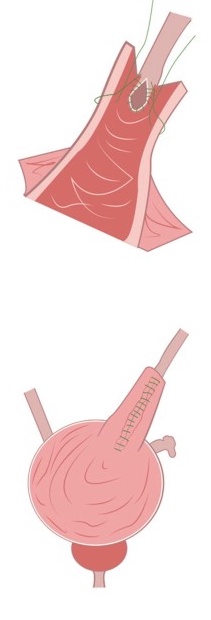Vesico-ureteric reflux, a condition commonly observed in children, occurs when urine flows back up the ureter toward the kidney due to increased pressure in the bladder. Children affected by reflux face heightened vulnerability to urinary tract infections, which can result in kidney scarring and impairment. In severe cases, the ureter and kidney may undergo enlargement, distortion, and reduced functionality. Ureteric reimplantation surgery serves as a treatment option for reflux.
About Ureteral Reimplantation Surgery
Ureteric Reimplantation involves surgically repositioning the tube that links the kidney to the bladder, known as the ureter. This procedure aims to prevent the backward flow of urine into the kidney (reflux) or alleviate obstruction at the lower end of the ureter. Depending on the specific condition, one or both ureters may require reimplantation during the surgery. Ureteral reimplantation surgery is a specialized procedure aimed at correcting abnormalities or damage to the ureters, the tubes that carry urine from the kidneys to the bladder. In Melbourne, this surgical intervention offers hope and relief for individuals struggling with various urinary issues.
Why Ureteral Reimplantation Surgery is Required?
This surgical intervention may address one (unilateral) or both (bilateral) ureters requiring repair. Several factors may necessitate surgical correction, including:
- Intolerance to antibiotic treatment in the child
- Persistence of urinary tract infections despite antibiotic therapy
- Continuation of reflux despite years of monitoring, indicating the child has not naturally "outgrown" the condition
- Abnormal kidney growth or development of scars despite medical intervention alone
- Parental preference for surgical intervention as an alternative to ongoing medical management
Understanding Ureteral Reimplantation Surgery
The ureters play a crucial role in urinary function, ensuring the smooth flow of urine from the kidneys to the bladder. However, conditions such as ureteral strictures, vesicoureteral reflux (VUR), or ureteropelvic junction (UPJ) obstruction can disrupt this process, leading to urinary complications and discomfort. Ureteral reimplantation surgery involves surgically repositioning the ureter where it connects to the bladder, allowing for improved urine flow and reducing the risk of complications. This procedure is often recommended when conservative treatments fail to resolve urinary issues or when there is significant damage to the ureter.
Benefits of Ureteral Reimplantation Surgery
Improved Urinary Function - By correcting abnormalities in the ureters, reimplantation surgery restores proper urine flow, alleviating symptoms such as urinary retention, frequent urinary tract infections, and urinary incontinence.
Prevention of Kidney Damage - Untreated ureteral conditions can lead to kidney damage over time. Reimplantation surgery helps prevent further harm to the kidneys by addressing the underlying issues affecting urine flow.
Enhanced Quality of Life - Individuals undergoing ureteral reimplantation surgery often experience a significant improvement in their quality of life, with reduced urinary symptoms and discomfort, allowing them to resume normal daily activities without hindrance.
Accessing Ureteral Reimplantation Surgery in Melbourne
In Melbourne, patients have access to leading medical facilities and experienced urologists specializing in ureteral reimplantation surgery. Hospitals and clinics equipped with state-of-the-art technology and a multidisciplinary team of healthcare professionals ensure optimal care and treatment outcomes for patients.
Preparation and Recovery
Before undergoing ureteral reimplantation surgery, patients will undergo a comprehensive evaluation to assess their overall health and suitability for the procedure. Pre-operative instructions will be provided to prepare for the surgery, including dietary restrictions and medication management. Recovery from ureteral reimplantation surgery varies depending on the individual's health and the complexity of the procedure. Patients can expect to stay in the hospital for a few days following surgery to monitor their condition and manage any post-operative discomfort. During this time, the medical team will provide instructions on wound care, pain management, and follow-up appointments.
Post-Surgery Care and Follow-Up
Following discharge from the hospital, patients will continue their recovery at home under the guidance of their healthcare provider. It's essential to adhere to post-operative instructions, including medication regimens, activity restrictions, and scheduled follow-up appointments to monitor progress and address any concerns.
- Regular follow-up visits with the urologist are crucial to assess the success of the surgery and address any lingering urinary symptoms or complications.
- Patients are encouraged to communicate openly with their healthcare team throughout the recovery process to ensure optimal outcomes and long-term urinary health.
- Ureteral reimplantation surgery offers a promising solution for individuals grappling with urinary issues in Melbourne.
- With skilled urologists, advanced medical facilities, and comprehensive post-operative care, patients can regain control of their urinary health and enjoy an improved quality of life.
If you're experiencing urinary symptoms or have been diagnosed with a ureteral condition, don't hesitate to consult with a healthcare provider to explore your treatment options, including ureteral reimplantation surgery.


No comments yet